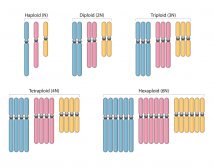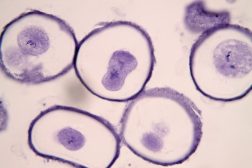replica plating
(Science: technique) technique for testing the genetic characteristics of bacterial colonies. A dilute suspension of bacteria is first spread, in a petri dish, on agar containing a medium expected to support the growth of all bacteria, the master plate. Each bacterial cell in the suspension is expected to give rise to a colony. A sterile velvet pad, the same size as the petri dish, is then pressed onto it, picking up a sample of each colony. The bacteria can then be stamped onto new sterile petri dishes, plates, in the identical arrangement. The media in the new plates can be made up to lack specific nutritional requirements or to contain antibiotics. Thus colonies can be identified that cannot grow without specific nutrients or that are antibiotic resistant and cells with mutations in particular genes can be isolated.
Dictionary > Replica plating
You will also like...

Evolution of Life – Ancient Earth
Autotrophs flourished, absorbing carbon and light. Soon after, primitive life forms that could assimilate oxygen thrived..

Plant Water Regulation
Plants need to regulate water in order to stay upright and structurally stable. Find out the different evolutionary adap..

Polyploidy
Humans are diploid creatures. This means that for every chromosome in the body, there is another one to match it. Howeve..

Meiosis – The Genetics of Reproduction
Meiosis is a form of cell division that creates gametes. It is comprised of two divisions that in the end, the resulting..

Human Biology – Food and Digestion
This tutorial recognizes the importance of food as a source of energy that will fuel many biological processes. A good d..

New Zealand’s Unique Flora
If New Zealand has lots of unique animals, it's also got a whole lot of unique plants. Find out more about some of them,..

